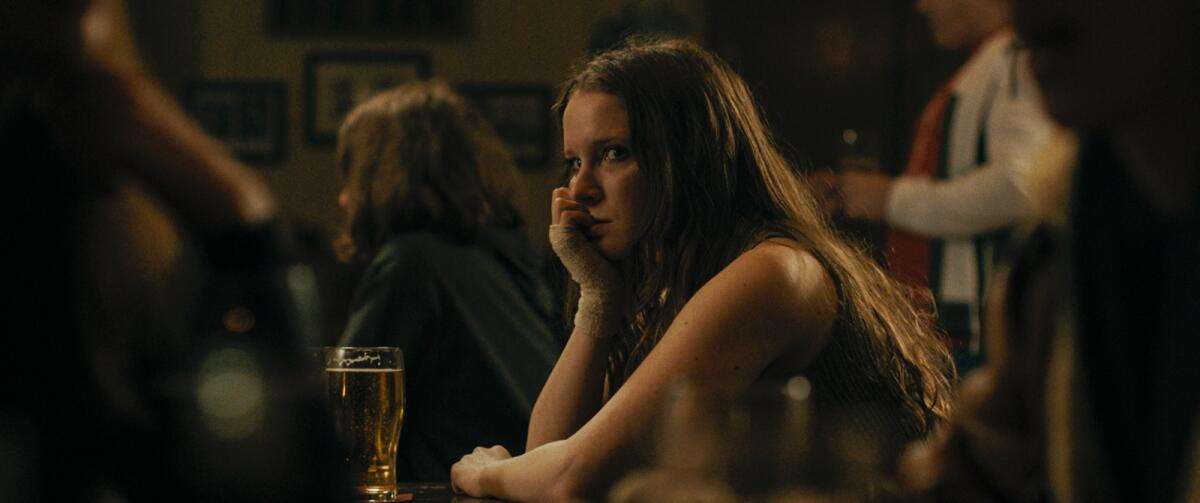Review: Villain and victim, a young woman sees herself as a martyr in horror of ‘Saint Maud’

The Times is committed to reviewing theatrical film releases during the COVID-19 pandemic. Because moviegoing carries risks during this time, we remind readers to follow health and safety guidelines as outlined by the Centers for Disease Control and Prevention and local health officials.
It’s a fine line between religious fervor and madness; perhaps there’s no line at all. It’s a question that has been explored time and time again in cinema, from Carl Theodor Dreyer’s “The Passion of Joan of Arc” to Brian De Palma’s “Carrie.” The English writer-director Rose Glass carries on the tradition in her remarkable directorial debut, “Saint Maud,” which is both clear-eyed about matters of belief and wonderfully abstract about how said beliefs manifest in reality. It’s an ecstatically bloody affair that imagines the inner world of a young woman driven to violence by the voices both inside and outside her head.
Morfydd Clark stars as Maud, a young nurse in a coastal English town who has taken a job as a live-in palliative caretaker for Amanda (Jennifer Ehle), a glamorous former dancer dying of cancer. As Maud tends to her patient, they grow close, sharing the space of Amanda’s dim, sprawling home outfitted with Art Deco wallpaper. Maud’s past is only cryptically alluded to: an old drinking pal and co-worker, Joy (Lily Knight), whom she runs into; an incident in a hospital hinted at.
Maud now has a close relationship with God, detailed in a narration of her prayers. The astute and sometimes capricious Amanda susses out that Maud’s devout faith is a recent conversion, and Maud confesses that she hears God’s voice and feels his presence, her body often overcome in writhing, nearly orgasmic fits. She hopes Amanda might feel this ecstasy of spirit too, that Maud might shepherd her to the grace of God she feels. She’s determined to become Amanda’s savior, despite the obstacles thrown her way, and this becomes Maud’s spiritual mission, but only for worse.
The pleasure that Maud finds in God displaces the pain that she experiences in the world: the pain of the sick and dying, the pain that people inflict upon others, her own psychic and emotional pain. She externalizes that mental agony in different ways, lashing out at Amanda’s cruel whims, or in self-destructive behavior, or in the kind of ancient, masochistic rituals only undertaken in the stories of Jesus Christ and other saints who martyred themselves for their faith. Maud believes pain should never be wasted, that it should lead to some lesson, salvation, blessing or transformation. But sometimes life is just painful. People die, and hurt each other, and themselves, with their words and their hands.
Glass has written an excellent and highly efficient script. There’s not a word wasted, especially the ones uttered by Amanda, who at the end of her life doesn’t have time or energy to waste. Her words cut to the quick of Maud’s beliefs, the constructions and delusions of a troubled and very lonely young woman. That efficiency extends to the lean running time. In only an hour and 24 minutes, Glass has crafted a film rich in history, reference, psychology, spirituality, style and even some gore, but it never overstays its welcome, recognizing that less is more.
What’s perhaps most striking about “Saint Maud” is how much Glass wants us to understand her maligned heroine, who is at once villain and victim. The treatment of this complex character is akin to De Palma’s “Carrie.” Glass allows us to see Maud, and the horrors around her, without judgment, and to understand that her fervor, which is her mental illness, is a reaction to trauma; that the choices she makes are both monstrous and her way of creating her own salvation. That approach is what elevates “Saint Maud,” and makes it feel like a true revelation.
Katie Walsh is a Tribune News Service film critic.
‘Saint Maud’
Rated: R, for disturbing and violent content, sexual content and language
Running time: 1 hour, 29 minutes
Playing: Starts Jan. 29, Vineland Drive-in, City of Industry; and in limited release where drive-ins and theaters are open; available Feb. 12 on Epix
More to Read
Only good movies
Get the Indie Focus newsletter, Mark Olsen's weekly guide to the world of cinema.
You may occasionally receive promotional content from the Los Angeles Times.






